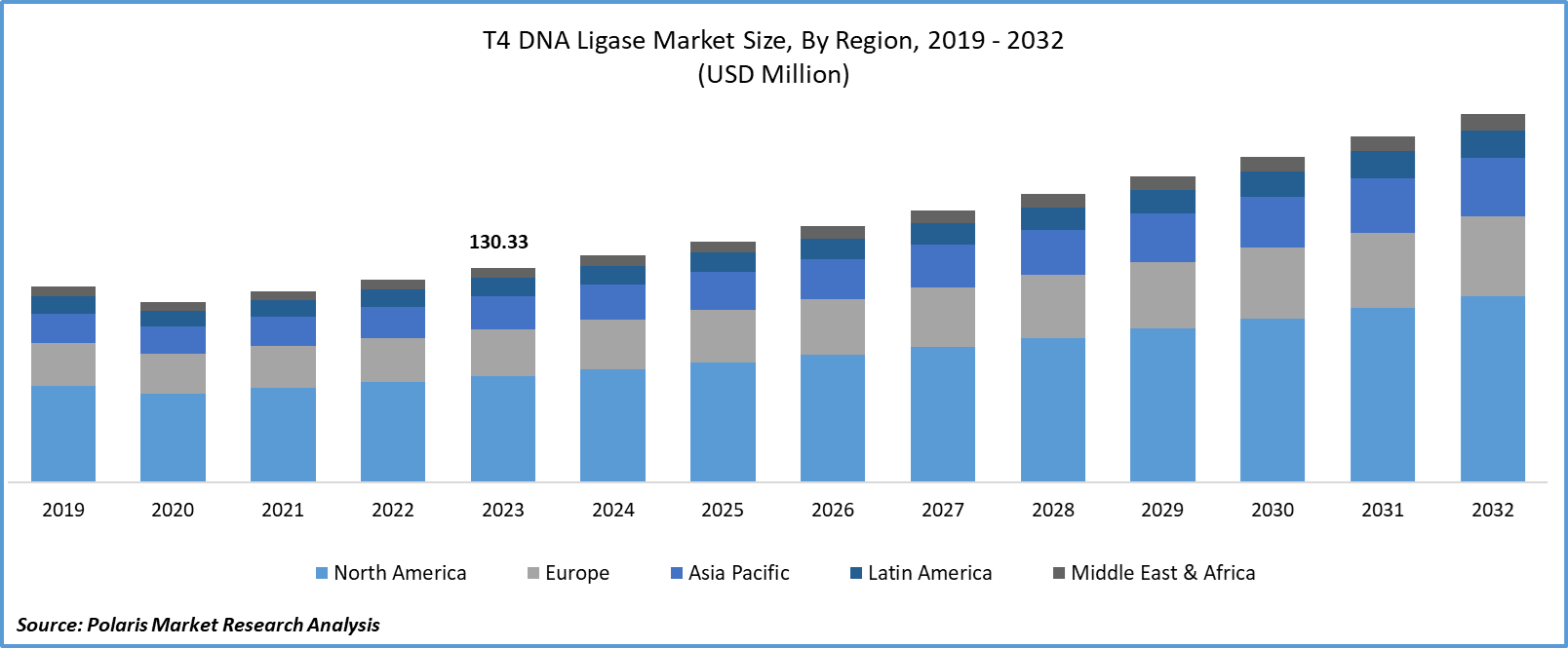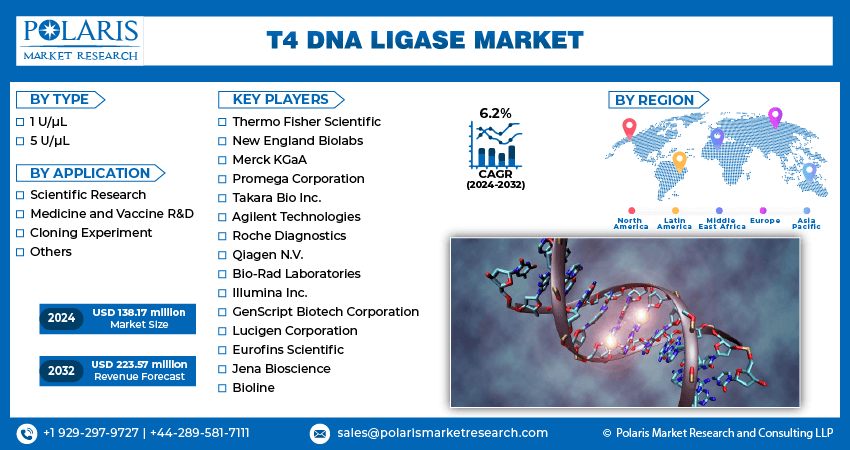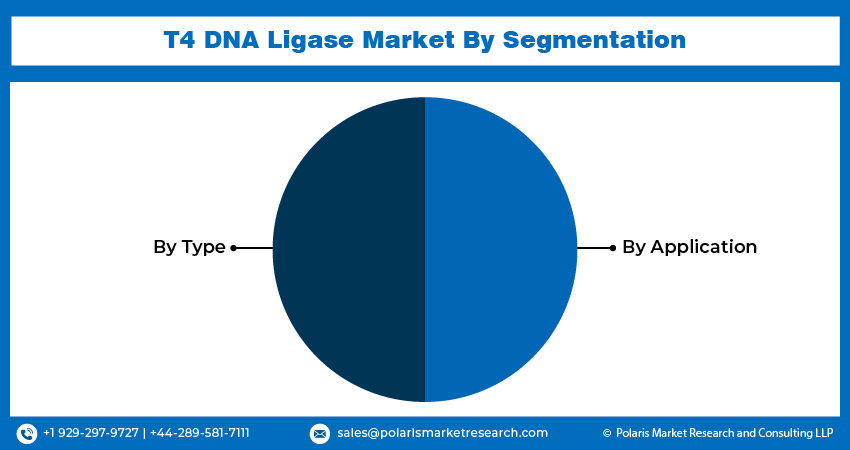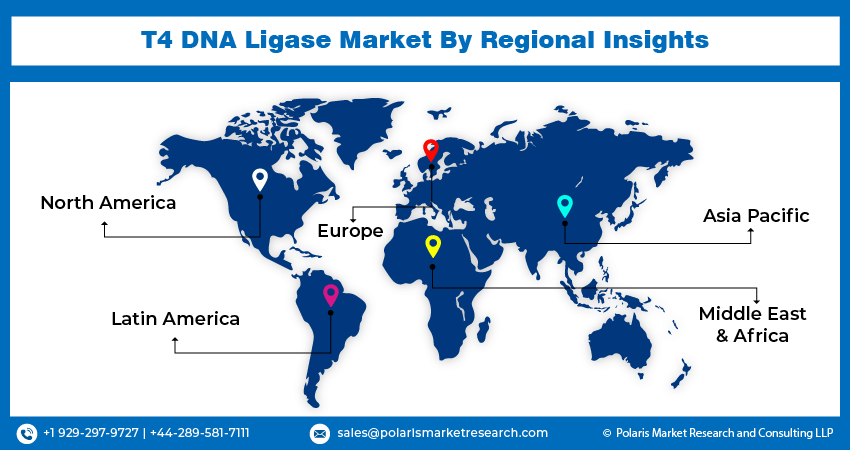
T4 DNA Ligase Market Size, Share, Trends, Industry Analysis Report: By Type (1 U/μL, 5 U/μL), By Application, and By Region (North America, Europe, Asia Pacific, Latin America, and Middle East & Africa) – Market Forecast, 2024 - 2032
- Published Date:Sep-2024
- Pages: 114
- Format: PDF
- Report ID: PM5050
- Base Year: 2023
- Historical Data: 2019-2022
T4 DNA Ligase Market Overview
Global T4 DNA ligase market size was valued at USD 130.33 million in 2023. The market is projected to grow from USD 138.17 million in 2024 to USD 223.57 million by 2032, exhibiting a CAGR of 6.2% during the forecast period.
The T4 DNA ligase market involves enzymes used in molecular biology to join DNA fragments, crucial for genetic research, cloning, and biotechnology applications. The growing field of molecular biology research and the rising demand for advanced genetic engineering techniques are fueling the robust rise of the global T4 DNA ligase market. Some of the key drivers driving the market include the rising adoption of recombinant DNA technology in drug development and diagnostics, as well as the growing need for efficient DNA cloning methods in biotechnology. The demand for T4 DNA Ligase is being driven by advancements in gene editing technologies such as CRISPR-Cas9. These trends are fueling the demand for T4 DNA ligase. Additionally, the increasing investment in synthetic biology and personalized medicine is expected to propel market growth further. For instance, the NIH allocated approximately $50 billion for biomedical research in 2023, supporting projects that use T4 DNA ligase.

To Understand More About this Research:Request a Free Sample Report
T4 DNA Ligase Market Trends
Rising Adoption of Gene Editing Technologies
One of the most significant trends in the T4 DNA Ligase market is the increasing adoption of gene editing technologies, particularly CRISPR-Cas9. This technology has revolutionized genetic research by enabling precise alterations in DNA sequences. T4 DNA ligase plays a crucial role in this process by facilitating the ligation of DNA fragments during gene editing. As CRISPR-Cas9 continues to gain traction across various applications, including therapeutic development, agricultural biotechnology, and disease modeling, the demand for T4 DNA Ligase is expected to rise correspondingly.
Growth in Synthetic Biology Applications
Synthetic biology, which involves designing and constructing new biological entities or systems, is another driving trend in the T4 DNA ligase market. This field relies heavily on the ability to assemble DNA fragments into functional genetic circuits, where T4 DNA ligase is essential for joining DNA molecules. The expansion of synthetic biology applications, ranging from biofuel production to the creation of novel biomaterials, is boosting the demand for reliable DNA ligation enzymes like T4 DNA Ligase. The market is also likely to benefit from the increasing investment in synthetic biology research and commercialization.
Increasing Focus on Personalized Medicine
Personalized medicine, which tailors medical treatment to the individual characteristics of each patient, is becoming a major focus in healthcare. This approach often involves the analysis of genetic information, where T4 DNA ligase is used in the preparation of DNA samples for sequencing and other genetic analyses. The rising interest in personalized medicine is driving the need for efficient molecular biology tools, including T4 DNA ligase, as they are critical in the development of diagnostic tests and therapeutic strategies based on an individual's genetic makeup. This trend is expected to significantly impact the T4 DNA Ligase market, contributing to its sustained growth.

T4 DNA Ligase Market Segment Insights
T4 DNA Ligase Market Breakdown by Type Insights
In the T4 DNA ligase market, the segmentation by type includes 1 U/μL and 5 U/μL variants, with the 5 U/μL segment emerging as the dominant force. The 5 U/μL type is favored due to its higher concentration, which allows for more efficient DNA ligation in complex and large-scale genetic engineering projects. This makes it a preferred choice in applications requiring high throughput and precision, such as in industrial biotechnology and advanced research settings. The dominance of this segment is also supported by its widespread use in synthetic biology and gene editing, where the demand for more potent ligation capabilities is paramount.
The 1 U/μL segment is also projected to be the fastest-growing due to its suitability for routine laboratory applications and educational purposes. This segment is particularly appealing to academic and small-scale research institutions where cost-effectiveness and ease of use are critical. As the market expands, driven by the increasing adoption of molecular biology techniques across various sectors, the 1 U/μL segment is expected to experience accelerated growth. Its rising popularity, especially in emerging markets and among new entrants in genetic research, underscores the segment's potential to capture a significant share of the market in the coming years.
T4 DNA Ligase Market Breakdown by Application Insights
In the T4 DNA ligase market, the segmentation by application reveals that scientific research is the dominant segment, driven by the enzyme's critical role in various genetic studies and molecular biology experiments. This segment's dominance is fueled by the extensive use of T4 DNA ligase in laboratories worldwide for DNA cloning, gene synthesis, and recombinant DNA technologies, all of which are foundational in scientific research. The broad application scope within academia, government research institutes, and private research facilities ensures that the scientific research segment maintains a leading position in the market.
Medicine and vaccine R&D are the fastest-growing segment, propelled by the increasing focus on developing new vaccines and gene therapies, especially in light of recent global health challenges. The urgent need for innovative medical solutions has accelerated research activities in this field, with T4 DNA ligase playing a crucial role in the development of vaccines, therapeutic proteins, and other biopharmaceuticals. As the healthcare industry continues to prioritize R&D efforts in precision medicine, personalized treatments, and vaccine development, this segment is expected to witness significant growth, outpacing other applications in the market.
T4 DNA Ligase Market, Segmental Coverage, 2019 - 2032 (USD million)

Source: Secondary Research, Primary Research, PMR Database and Analyst Review
T4 DNA Ligase Market Breakdown by Regional Insights
By region, the study provides market insights into North America, Europe, the Asia Pacific, Latin America, and the Middle East & Africa. North America is the leading region in the T4 DNA ligase market. This is mostly because of the region’s advanced biotechnology and pharmaceutical sectors, as well as large investments in genetic research and development. Also, the presence of leading research institutions, biopharmaceutical companies, and a strong focus on innovative healthcare solutions contribute to North America's leadership in the market. Additionally, government support for biotechnology research and a robust intellectual property framework further bolsters the region's dominance.
T4 DNA Ligase Market, Regional Coverage, 2019 - 2032 (USD million)

Source: Secondary Research, Primary Research, PMR Database and Analyst Review
Europe is a significant player in the T4 DNA ligase market, driven by its well-established research infrastructure and strong academic institutions. The region is a home to numerous biotech startups and pharmaceutical companies that are actively engaged in genetic research, fostering a robust demand for T4 DNA ligase. Countries such as Germany, the UK, and France are at the forefront, benefiting from government funding and initiatives that support biotech innovation. Additionally, Europe’s focus on personalized medicine and advanced therapeutic development contributes to the steady growth of the market. The region’s stringent regulatory environment, which ensures high-quality standards in research and product development, further enhances its position in the market.
The Asia Pacific region is experiencing rapid growth in the T4 DNA ligase market, fueled by the expanding biotechnology and pharmaceutical sectors, particularly in countries including China, India, and Japan. The region is becoming a hub for R&D activities due to increasing investments in healthcare infrastructure and government initiatives aimed at advancing biotech research. The growing number of research institutions and biotech startups, coupled with the rising demand for genetic engineering in agriculture and medicine, is propelling market expansion. The availability of a skilled workforce and cost-effective manufacturing capabilities also make the Asia Pacific an attractive market for T4 DNA ligase, positioning it as a key emerging region in the global landscape.
T4 DNA Ligase Market – Key Market Players & Competitive Insights
Key players in the global T4 DNA ligase market include prominent companies such as Thermo Fisher Scientific; New England Biolabs; Merck KgaA; Promega Corporation; Takara Bio Inc.; Agilent Technologies; Roche Diagnostics; Qiagen N.V; Bio-Rad Laboratories; Illumina Inc.; GenScript Biotech Corporation; Lucigen Corporation; Eurofins Scientific; Jena Bioscience; and Bioline (Meridian Bioscience). These companies play a crucial role in shaping the market by offering a wide range of T4 DNA Ligase products tailored to various applications, including molecular cloning, gene synthesis, and advanced genetic research.
Thermo Fisher Scientific and New England Biolabs stand out as prominent players due to their extensive product portfolios, strong global presence, and continuous innovation in enzyme technologies. These companies have a competitive edge by offering high-quality ligase enzymes that cater to diverse research needs, from basic research to complex gene editing projects. Merck KGaA and Promega Corporation also hold significant market shares, benefiting from their robust distribution networks and focus on customer-centric solutions. Their strategic collaborations and partnerships with research institutions further enhance their market positioning.
The competitive landscape is characterized by ongoing innovation, with companies focusing on enhancing the efficiency and specificity of their T4 DNA ligase products to meet the evolving demands of the biotechnology and pharmaceutical industries. The market is also witnessing a trend toward strategic mergers and acquisitions as companies aim to expand their product offerings and strengthen their market presence. The increasing focus on personalized medicine, synthetic biology, and gene therapy is expected to drive further competition among these key players as they seek to capitalize on emerging opportunities in these high-growth areas.
Thermo Fisher Scientific is one of the crucial players in the T4 DNA ligase market, known for its extensive portfolio of molecular biology products and strong global presence. The company offers high-quality T4 DNA ligase enzymes that are widely used in genetic research, biotechnology, and pharmaceutical applications. Thermo Fisher's commitment to innovation and customer-focused solutions has helped it maintain a competitive edge in the market.
New England Biolabs (NEB) is another major player in the T4 DNA ligase market, renowned for its pioneering enzyme development and deep expertise in molecular biology. NEB's T4 DNA Ligase products are highly regarded for their reliability and performance, making the company a preferred choice for researchers worldwide. NEB's focus on sustainability and innovation has also set it apart in the industry.
List of Key Companies in T4 DNA Ligase Market
- Thermo Fisher Scientific
- New England Biolabs
- Merck KGaA
- Promega Corporation
- Takara Bio Inc.
- Agilent Technologies
- Roche Diagnostics
- Qiagen N.V.
- Bio-Rad Laboratories
- Illumina Inc.
- GenScript Biotech Corporation
- Lucigen Corporation
- Eurofins Scientific
- Jena Bioscience
- Bioline
T4 DNA Ligase Industry Developments
- June 2024: Thermo Fisher announced the expansion of its gene therapy manufacturing capabilities with a new state-of-the-art facility, reinforcing its position as a key player in the biotechnology sector.
- May 2024: NEB launched a new product line of high-efficiency ligases designed to improve the speed and accuracy of DNA ligation, highlighting its ongoing commitment to advancing genetic research and biotechnology.
T4 DNA Ligase Market Segmentation
By Type Outlook, (Revenue- USD million, 2019–2032)
- 1 U/μL
- 5 U/μL
By Application Outlook, (Revenue- USD million, 2019–2032)
- Scientific Research
- Medicine and Vaccine R&D
- Cloning Experiment
- Others
By Regional Outlook, (Revenue- USD million, 2019–2032)
- North America
- US
- Canada
- Europe
- Germany
- France
- UK
- Italy
- Spain
- Netherlands
- Russia
- Rest of Europe
- Asia Pacific
- China
- Japan
- India
- Malaysia
- South Korea
- Indonesia
- Australia
- Vietnam
- Rest of Asia Pacific
- Middle East & Africa
- Saudi Arabia
- UAE
- Israel
- South Africa
- Rest of Middle East & Africa
- Latin America
- Mexico
- Brazil
- Argentina
- Rest of Latin America
T4 DNA Ligase Report Scope
|
Report Attributes |
Details |
|
Market Size Value in 2023 |
USD 130.33 million |
|
Market Size Value in 2024 |
USD 138.17 million |
|
Revenue Forecast in 2032 |
USD 223.57 million |
|
CAGR |
6.2% from 2024 to 2032 |
|
Base Year |
2023 |
|
Historical Data |
2019 – 2022 |
|
Forecast Period |
2024 – 2032 |
|
Quantitative Units |
Revenue in USD million and CAGR from 2024 to 2032 |
|
Report Coverage |
Revenue Forecast, Market Competitive Landscape, Growth Factors, and Trends |
|
Segments Covered |
|
|
Regional Scope |
|
|
Competitive Landscape |
|
|
Report Format |
|
|
Customization |
Report customization as per your requirements with respect to countries, regions, and segmentation. |
How is the report valuable for an organization?
Workflow/Innovation Strategy:
The T4 DNA ligase market has been segmented into detailed segments of types and applications. Moreover, the study provides the reader with a detailed understanding of the different segments at both the global and regional levels.
Growth/Marketing Strategy:
The growth and marketing strategy in the T4 DNA ligase market is centered around product innovation, strategic collaborations, and expanding market presence in emerging regions. Companies are focusing on developing high-efficiency ligase enzymes tailored for specific applications, such as gene editing and synthetic biology, to meet the evolving needs of researchers and biotech firms. Strategic partnerships with academic institutions and biotech companies are also key to enhancing product visibility and driving adoption. Additionally, expanding distribution networks and targeting untapped markets in the Asia Pacific and Latin America are critical components of their strategy to capture a larger market share.
FAQ's
The global T4 DNA Ligase Market size was valued at USD 130.33 million in 2023 and is projected to grow to USD 223.57 million by 2032.
The global market is projected to exhibit a CAGR of 6.2% during the forecast period, 2023-2032.
North America had the largest share of the global market
Key players in the global T4 DNA Ligase market include prominent companies such as Thermo Fisher Scientific, New England Biolabs, Merck KGaA, Promega Corporation, Takara Bio Inc., Agilent Technologies, Roche Diagnostics, Qiagen N.V., Bio-Rad Laboratories, Illumina Inc., GenScript Biotech Corporation, Lucigen Corporation, Eurofins Scientific, Jena Bioscience, and Bioline (Meridian Bioscience).
The 5 U/µL dominated the market in 2023.
The scientific research segment had the largest share of the global market.
T4 DNA Ligase is an enzyme commonly used in molecular biology for joining DNA fragments together. It catalyzes the formation of phosphodiester bonds between the 3' hydroxyl and 5' phosphate ends of adjacent DNA strands, effectively "gluing" them together. This enzyme is crucial in various applications, including DNA cloning, gene assembly, and the construction of recombinant DNA molecules. T4 DNA Ligase is derived from the T4 bacteriophage, which infects Escherichia coli bacteria, and is valued for its ability to work efficiently with a range of DNA substrates and in various conditions.
Here are some key trends observed in this market: Rising Adoption of Gene Editing Technologies: Increasing use of CRISPR-Cas9 and other gene-editing tools boosts demand for efficient ligase enzymes. Growth in Synthetic Biology Applications: Expanding applications in synthetic biology and bioengineering drive the need for advanced DNA ligation solutions. Increasing Focus on Personalized Medicine: The demand for tailored medical treatments and diagnostics fuels the need for precise DNA manipulation techniques. Technological Advancements in Enzyme Development: Innovations in enzyme formulations and efficiency enhance the performance and applications of T4 DNA Ligase.
To stay ahead in the T4 DNA Ligase market, a new company should focus on developing innovative and high-performance ligase enzymes that cater to the latest trends in gene editing and synthetic biology. Investing in research and development to enhance enzyme efficiency, specificity, and stability will be crucial. Additionally, targeting emerging markets with tailored solutions and establishing strategic partnerships with academic and research institutions can provide a competitive edge. Offering comprehensive support services, such as technical expertise and custom formulations, along with competitive pricing, can further differentiate the company and drive adoption among researchers and biotech firms.
Companies producing T4 DNA Ligases and related products, healthcare providers, and other consulting firms.
